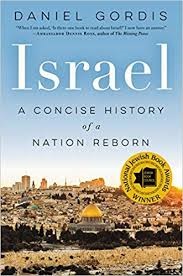Israel by Daniel Gordis (Book Review)

The problem with writing a “concise” history on any topic is a matter of granularity. How much can an author expect the reader to know about the topic at hand? Will the reader want to know more about the history of the topic or its contemporary politics? Daniel Gordis’ Israel: A Concise History of a Nation Reborn manages to touch on all the necessary particulars to bring a reader up to speed on how the state of Israel has come to assume its current position in both world and regional politics. A contemporary book on Israel needs to read well to a modern audience, and within that audience there will be many groups who will each want to know something different: young American Jews, Baby Boomers, evangelicals, etc. Gordis’ achievement is all the more impressive in that his book is a “fun read”, in no ways a slog, and even a bit inspiring.[1] Amazingly, he is the first American Jew since 1976 who has written a history of Israel that is not two or more volumes in length!
Having limited knowledge of Jewish history myself, Gordis did a good job at presenting the historical political climate Jews experienced in 19th century Europe and how these (oppressive) forces led to the early Zionist movement. While today’s Zionism seems far removed from its early socialistic tendencies (the kibbutzim now being largely a symbolic system), even at its first convention in 1897 it was far from unified. If Zionism is the desire for the Jewish State, would that state be Jewish or would the state be made up of Jews? In other words, what role would secularism play. And where would this state be located? Would the entire island of Madagascar be better than a small plot somewhere in Palestine? Or would an autonomous region within the Ottoman Empire be sufficient? And if any Jew was entitled to come to Israel, what would be the official language of the state?
Zionism had become a series of unresolved debates. Some (Herzl) sought a state while others (Ahad Ha’am) insisted that statehood would lead to spiritual bankruptcy, so the Jews should seek only a spiritual center. Some (Bialik) thought religion was the cancer that had destroyed the Jew, while others (religious Zionists) saw in religion the only hope for sustaining the Jewish people. Some ignored the Arab issue so consistently that they seemed to imagine a Palestine in which there were simply no Arabs. Still others (Herzl), not that different, hoped that the progress Jews would bring to the region would earn them the respect and admiration of their Arab neighbors. Others (Jabotinsky), however, thought those views foolish and said that if Jews were not willing to fight, they had no future in Zion. Some (Nordau) imagined a Jew redeemed by a new physicality, while others (A. D. Gordon) insisted that the physicality had to be rooted in working the land. Zionism was a movement, but it was also a collection of competing dreams.
Despite these internal disagreements, Jews at the turn of the century were united in the desire to be able to live safe and sane lives. Peaceful periods of existence were inevitably punctuated by bursts of native violence – the most vicious being the pogroms that occurred in the Russian empire before the first world war. The Zionist movement was also blessed with highly charismatic figures (like Weizmann) or influential ones (like Edmond James) that were able to present the geopolitical benefits a Jewish state would bring to the then world powers. The first (and contentious) success of the Zionist movement was the Balfour Declaration.
His Majesty’s government view with favour the establishment in Palestine of a national home for the Jewish people, and will use their best endeavours to facilitate the achievement of this object, it being clearly understood that nothing shall be done which may prejudice the civil and religious rights of existing non-Jewish communities in Palestine, or the rights and political status enjoyed by Jews in any other country.
While the Balfour Declaration was a remarkable statement coming from the British government a mere 30 years after the First Zionist Congress, it impressively managed to promise nothing of consequence whilst also sounding beneficial to the Jewish cause. What exactly is a “national home”, as it is clearly not a “state” or a “nation”? What was the timeline for establishing this home? How would the home be built without “prejudicing” the existing communities? And what was Palestine for that matter? The British mandate or a historical conception of the land? To quote The Hollowmen: policy on the run is policy underdone. Poor planning by British policy makers lead to a cycle of both Arab Revolts as well as Jewish uprisings in Mandate Palestine. If there was to be a Jewish homeland in Palestine, surely Jews from around the world should have the right to emigrate there. And if land was acquired through private purchases and not force, how could the indigenous population complain? For the Arabs, it was clear that their birthright was being bought out from under them. Even if the land was acquired legally from disinterested and wealthy landlords, the ultimate consequence would be the same for most Palestinians as if their land had been expropriated by force.
When Zionists ultimately succeeded in creating a state, however, all these rival factions would have to live together in what would become a hastily declared and built country. As much as they disagreed with one another they would have to live, love, go to battle, build a country–and die–together. Israel’s factious politics and turbulent political life are, in many respects, the result of early, unresolved Zionist debates… Zionism was in some ways “forced to put forth branches before it had time to strike root”.
By 1947, the United Nations had passed a resolution supporting a two-state solution in the British Mandate. While the Jewish leadership accepted the recommendations of the plan, the Arabs outright rejected it and an inter-communal war began almost immediately. By the next year, Israel declared independence and a full-blown war had begun. While the CIA and most Western analysts predicted the Israel would be defeated within a year, miraculously the newly-formed Israeli Defense Force managed to defeat the combined armies of Egypt, Jordan, Iraq, Syria, Lebanon, Saudi Arabia, and Yemen.
One of most surprising realities of Israel’s early history was its strained relationship to the holocaust and its survivors. While many contemporary reader’s will associate Israel’s raison d’etre, with the holocaust, for the early Zionists, Israel was a home for the a new “muscular” Jew. No longer would Jews need to cower in fear as the mob gathered outcome the shtetl walls. The holocaust would have been just more evidence to Max Nordau that Jews will never be safe in Europe. But the emaciated and destitute holocaust survivors that came to Israel were not “muscular” in any sense of the word. They were a humiliating reminder of how weak Jews had been just a few years ago. Instead of being celebrated as survivors from one of history’s most traumatic events, they were ignored and on some occasions mocked.
For years, both Holocaust survivors and Israeli society had avoided speaking about what had happened in Europe in the 1940s. For the survivors, the memories were simply too painful. For Israeli society, the subject evoked both images of the Yishuv’s inability to help and the image of a European Jew-as-victim that Israel sough to transcend.

Israel: a home for Nordau's "muscular" Jew
The holocaust would have many unanticipated consequences for Israeli’s polity – the first stemming from a reparations agreement between West Germany and Israel that was signed in 1952. For many Jews, the settlement amounted to “money for blood”. But the agreement also planted the seeds of destruction for the kibbutzim movement.
… many of the kibbutzim outlawed private property with no exceptions. Members shared everything … Children were raised not by their parents but in the communal children’s residences, where they slept from infancy. With the reparations, though, a crack in that policy also appeared. Survivors suddenly resisted the notion that the money they would receive for their own indescribable suffering should be shared with those who had not been through the Holocaust. Some kinds of property, they insisted, were simply not meant for everyone.
Today Adolf Eichmann’s capture by Israeli agents in Buenos Aires is considered one of country’s most impressive and dashing acts of international élan on par with the raid on Entebbe. Surprisingly though, at the time, most countries (including the United States) reacted negatively to this assault on Argentinian sovereignty. Even the American Jewish Committee (AJC) thought that holding the trial in Israel would send a poor signal as Eichmann should be tried for his crimes against humanity and not just those of Jews. American Jews, who were the most assimilated and wealthy of any Jewish community, felt threatened by Israel assuming the mantle of a Jewish “capital”. For a diaspora people, who had the right to say where Jews should look to for economic, spiritual, or political guidance? The AJC was worried that the Eichmann trial would help to draw a clear distinction between Jews and non-Jews. For many who had worked hard to make sure America saw Jews and American Jews, and not Jews in America, the potential risks of “othering” outweighed the obvious demands for justice.
Just as reparations had hastened the unraveling of the kibbutz’s foundational ethos, it was ironically the capture of a Nazi that drive a further wedge into the relationship between the Jews of Israel of those of the United States.
Zionism’s spiritual and intellectual basis can perhaps be thought of re-imagining of what a new Jewish homeland would look like: how would Judaism and Jewishness interact to produce a state in which Jews could speak their own language and make their own laws. In practice, history has forced Zionism to be largely reactionary to cataclysmic anti-semitic events from the pogroms to the Holocaust. This makes it all the more impressive that Hebrew, long a dead language relegated to religious text understood by a small number of Rabbis, would come to be the official and working language of a country. And in contrast to its highly secular founding fathers, Israel today is a thriving spiritual center of Judaism. As Charles Krauthammer put it, Israel has become “a country that comes to a standstill on Yom Kippur; speaks the language of the Bible; moves to the rhythms of the Hebrew (lunar) calendar; builds cities with the stones of its ancestors; produces Hebrew poetry ad literature, Jewish scholarship and learning unmatched anywhere in the world.”
If Herzl was the father of political Zionism and Ahad Ha’am was the progenitor of the spiritual side of the Zionist movement… Eliezer Ben-Yehuda … is the father of modern Hebrew.
Aham Ha’am would no longer need to worry about Israel being a state without a purpose. But in embracing its religious identity, the Jewish state made a series of policy miscalculations that now threaten its long-term economic and military standing.
By 1963, when Ben-Gurion realized that he had been wrong to release the Haredi students from army service, he wrote Eshkol, who was then prime minister: “I released yeshiva students from army service. I did so when their number was small, but now they are increasing. When they run amok, they represent a danger to the honor of the state.” Much more than the state’s honor was at stake… by 2014 Haredim constituted approximately 15 percent of Israel’s Jewish population, and the percentage was growing… Because the vast majority of Haredi boys cease their secular education at the age of fourteen, they are much less prepared for the job market and remain increasingly dependent of the government. In 2010, the universally liked and admired Bank of Israel governor, Stanley Fischer, warned that without a significant change in policy, Israel’s prosperity in light of the Haredi numbers was simply “not sustainable”.
Some decisions in Isreal’s history seem to have outsized effects on future policy choices and politics. Ben Gurion’s release of the ultra-orthodox from military service, the ambiguity of the Balfour Declaration, or Israel’s expansion into new territories during the Six Day War. Gordis’ book is essential reading for understanding how Israel has come to establish itself and flourish in the early 21st century. Whether Israel can maintain its equanimity in a sea of hostility will depend on how well it grapples with the paradoxes and challenges it faced throughout its entire history.
-
At 420 pages Israel: A Concise History of a Nation Reborn is much shorter that the other acclaimed history of Israel books including Martin Gilbert’s which is around 850 pages and Sachar’s which exceeds 1200 pages! ↩
